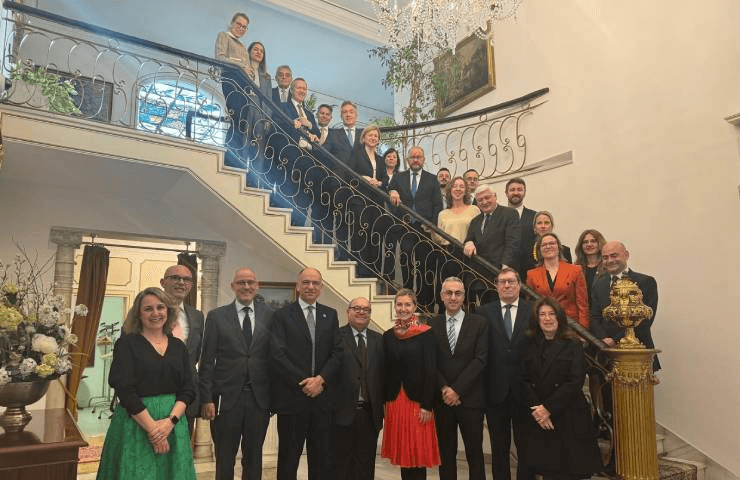Enrico Letta presents Europa. Última Oportunidad at IE University – A Vision for Europe’s Strategic Future

On March 26th, 2025, Enrico Letta, Dean of IE School of Politics, Economics and Global Affairs, presented his new book, Europa. Última Oportunidad, during two high-level events in Madrid that brought together policymakers, thought leaders, and journalists to discuss the future of the European Union, economic competitiveness, and strategic autonomy.
EU27 Heads of Mission Discuss Europe's Strategic Challenges
The day began with a private breakfast briefing with EU27 Heads of Mission, convened by the Embassy of Poland where the Director of the Global Policy Center, Ilke Toygür was also present. Letta introduced key themes from his book, emphasizing the urgent need to reform the EU Single Market and strengthen Europe’s innovation capacity, strategic autonomy, and geopolitical positioning in a rapidly changing global order.
Public Presentation at IE Tower Highlights Vision for a Resilient Europe
Later that day, the IE University hosted the public launch of Letta’s book, in partnership with Espasa at IE Tower. The discussion featured high-profile speakers: Carlos Cuerpo, Spain’s Minister of Economy, Trade and Business, and Antonio Garamendi, President of CEOE. The conversation was moderated by journalist Belén Carreño, focusing on Europe’s economic resilience, institutional reform, and energy strategy. Moreover, Ilke Toygür presented the GPC’s key research questions within its Future of Europe research line.
Letta urged a multi-dimensional approach to European security, not limited to military defense but including the development of a robust financial and telecom market, and energy independence. He called for a unified energy market and stronger infrastructure interconnections across member states.
"Europe doesn’t have a technology problem, but a mindset problem," Letta stated, referencing barriers rooted in national investment strategies and a lack of policy coordination.
He highlighted the need for a fully integrated Single Market that provides local economic opportunities, helping reduce emigration driven by limited prospects. He also criticized Europe’s risk-averse investment climate, especially in comparison to the United States, and proposed a shift from fragmented regulation toward a single EU-wide legal framework to streamline business operations and boost competitiveness.
Key Takeaways from Spain's Economic and Business Leaders
Carlos Cuerpo called Letta’s work "an inspiration," advocating for the creation of a Capital Markets Union that could funnel investment into productive sectors. He emphasized the need for standardized credit ratings for SMEs and financial product labelling to mobilize capital more efficiently.
He recognized the practicality of Letta’s proposals but pointed to governance and funding challenges as implementation hurdles. To overcome these, he proposed forming "coalitions of the willing," backed by the European Commission, to promote faster integration and policy innovation.
Antonio Garamendi stressed the role of businesses in enabling a just green transition, particularly in energy and mobility. He highlighted the need for profitability to support higher wages, R&D investment, and talent retention. He also underscored the importance of maintaining institutional loyalty, social dialogue, and core European values such as democracy, human rights, and sustainability.
A Timely Call to Action for Europe
Letta’s Europa. Última Oportunidad arrives at a defining moment for Europe. The book calls for a comprehensive reactivation strategy focused on competitiveness, industrial policy, and institutional reform. His message is clear: without decisive action, Europe risks losing its relevance. “Europe is imperfect, but it is irreplaceable”.
Stay Updated
For more on EU policy, European competitiveness, and strategic discussions on Europe’s future, follow the Global Policy Center as we continue to engage with leading voices shaping Europe’s trajectory.
